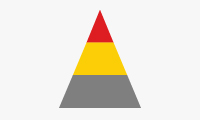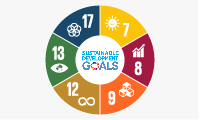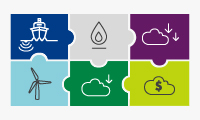Spill response and prevention
When a leak is identified on SPDC JV or SNEPCo assets, production is suspended and efforts are made to contain any spilled oil as part of our emergency spill response. We carry out this response in compliance with government regulations and in line with other standards at Shell-operated ventures globally. A joint investigation visit team comprising representatives of SPDC, regulators, government security agencies, state government and communities, is dispatched to spill sites to establish the cause, volume of oil spilled and what further action is required.
The vast majority of oil spills in the Niger Delta continue to be caused by crude oil theft or sabotage of pipelines, as well as illegal oil refining. In 2017, close to 90% of the number of oil spills from SPDC JV facilities was due to illegal activities. Regrettably, spills also occur due to operational reasons.
Regardless of the cause, SPDC cleans up and remediates areas impacted by spills that come from its facilities. In the case of operational spills, SPDC also pays compensation to people and communities impacted by the spill. Once the clean-up and remediation are completed, the work is inspected, and, if satisfactory, approved and certified by Nigerian government regulators.
SPDC works with government agencies, non-governmental organisations and communities to prevent and minimise spills from illegal activity. In 2017, we continued air and ground surveillance as well as installing antitheft mechanisms on equipment and pipelines to mitigate third-party interference and ensure that spills are detected and responded to as quickly as possible. There were daily flights over the pipeline network to identify any new spill incidents or illegal activities.
Since 2012, SPDC has worked with the International Union for Conservation of Nature to enhance remediation techniques and protect biodiversity at sites affected by oil spills in SPDC’s areas of operation in the Niger Delta. In 2017, SPDC launched new initiatives, such as a Niger Delta biodiversity strategy and a toolkit which provides guidance on restoring mangroves that will help to strengthen its remediation and rehabilitation efforts.
Clean-up efforts in Ogoniland
SPDC is working with the relevant stakeholders to implement the 2011 UN Environmental Programme (UNEP) report on Ogoniland. Over the last six years, SPDC has taken action on all the UNEP recommendations addressed specifically to it as operator of the joint venture and has completed the majority of these recommendations.
The UNEP report recommended the creation of an Ogoni Restoration Fund with $1 billion capital, to be co-funded by the Nigerian government, the SPDC JV and other operators in the area. SPDC is supporting and contributing its share to the fund and on behalf of the SPDC JV made $10 million available in 2017 to help set up the Hydrocarbon Pollution and Remediation Project (HYPREP), a government-led body to clean up contaminated sites. The body agreed to $33 million in funding for areas such as emergency water supply, scoping of contaminated sites and alternative livelihood programmes.
Throughout 2017, SPDC representatives continued to actively support the clean-up process within the governance framework established in August 2016 by the Nigerian government. Some stakeholders have expressed concern about the pace of reaching decisions and taking action on the clean-up process. The Nigerian government and HYPREP strongly advocate setting up a transparent governance structure before starting actual clean-up.
Clean-up and remediation of Bodo
In 2015, SPDC - on behalf of the SPDC JV - and the Bodo community signed a memorandum of understanding granting SPDC access to begin the clean-up of areas affected by two operational spills in 2008. As part of this, two contractors were selected to conduct the clean-up and be overseen by an independent project director. The clean-up project suffered a delay in 2016 and most of 2017 due to difficulties accessing the sites.
After significant engagement with the communities and other stakeholders, managed by the Bodo Mediation Initiative, the clean-up and remediation activities at Bodo started in September 2017. The clean-up will consist of four phases: clean-up of free-phase surface oil; remediation of soil; restoration of mangroves; and monitoring. Should activities continue uninterrupted, the process is expected to take around three years. However, for it to be successful, the repeated re-contamination of remediated sites due to crude oil theft and illegal refining must end.
Spills and response data
Crude oil theft from SPDC JV’s pipeline network amounted to around 9,000 barrels of oil a day (b/d) in 2017, an increase from around 6,000 b/d in the previous year. The increase in 2017 can in part be explained by the militant-induced shutdown of the Forcados export terminal in 2016, which reduced opportunities for third-party interference. This demonstrates that continued air and ground surveillance as well as the action by the government security forces remain necessary to prevent crude oil theft. Since 2012, SPDC has removed more than 950 illegal theft points.
The number of operational spills from Shell companies in Nigeria increased from eight in 2016 to nine in 2017. However, the volume of oil spilled in operational incidents decreased to 0.1 thousand tonnes compared to 0.3 thousand tonnes in 2016.
The number of sabotage-related spills in 2017 increased to 62 from 48 in 2016. Theft and sabotage caused close to 90% of the number of spills of more than 100 kilograms from SPDC JV pipelines, with the balance being operational spills.
In 2017, 92 sites were remediated and certified (out of 251 identified for this work), with 32 in Ogoniland. During 2017, 84 new sites requiring remediation were identified, of which eight are in Ogoniland. In total, there are 243 oil spill sites that require remediation.
External voice: "We simply cannot blame one party for all the woes in the Niger Delta"

In the past four and half years, initially as co-chairman, and now as chairman, I can confirm that it’s been an intense, prolonged and sometimes quite complex and frustrating process. I’m glad to say that despite all the challenges, we’ve been able to collectively start the clean-up of the polluted sites in Bodo community. We couldn’t have done this without the sustained commitment and tenacity displayed by both SPDC and the Bodo community.
The Bodo mediation process is a delicate process based on trust and confidentiality. As an activist and a constructive critic of some of the practices by the international oil companies in the Niger Delta, I’ve come to realise that responsibilities are shared and we simply cannot blame one party for all the woes in the Niger Delta. Therefore, it would take the collective efforts of the federal, state and local governments, IOCs, civil society and the communities to resolve some of these intricate challenges. What we have achieved so far in the Bodo clean-up exercise is proof that it is possible to do so.
The main priority of the Bodo Mediation Initiative is to ensure that as we move smoothly from phase one to phase two of the clean-up, all parties, in particular the Bodo community and SPDC remain committed to the Initiative's process and clean-up of the Bodo community.
 Sustainability at Shell
Sustainability at Shell
 Sustainable development goals
Sustainable development goals
 About our data
About our data
 Energy transition and climate change
Energy transition and climate change